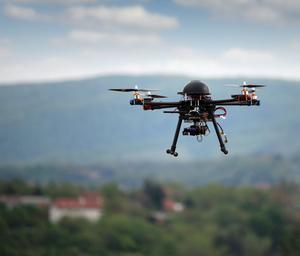Drone Searches and Illinois Law
 New technology is constantly revolutionizing the way that police do their jobs, and that means that the law has to keep up in order to protect people's civil rights. One of the most common places where new technology butts up against people's rights is in the area of searches. The Fourth Amendment provides citizens with protection from unreasonable searches and seizures, but it does not define unreasonable. Over the years, courts have had to deal with wiretaps, heat vision, and GPS trackers, just to name a few pieces of technology.
New technology is constantly revolutionizing the way that police do their jobs, and that means that the law has to keep up in order to protect people's civil rights. One of the most common places where new technology butts up against people's rights is in the area of searches. The Fourth Amendment provides citizens with protection from unreasonable searches and seizures, but it does not define unreasonable. Over the years, courts have had to deal with wiretaps, heat vision, and GPS trackers, just to name a few pieces of technology.
Now, a new technology is creating another future Fourth Amendment issue: police drones. Police have had access to aerial surveillance for decades, but drones are different. Ordinary aerial surveillance is expensive. It requires helicopters and officers and a good deal of time and money. Drones make those searches much easier and cheaper.
Drones and the Fourth Amendment
The Supreme Court has yet to deal with the issue of drones, but it has handled other types of aerial surveillance. The Court has heard several cases on ordinary aerial searches, usually in the context of a police helicopter that spotted a person growing marijuana. These cases resulted in something known as the "flyover exception" to the Fourth Amendment.
Fourth Amendment law is based largely on whether the person had a "reasonable expectation of privacy." With regard to aerial searches, the Court reasoned that something that could be spotted by anyone who happened flying overhead could not be reasonably expected to be private. This meant that it was not an unreasonable search under the Fourth Amendment, so the police did not need a warrant.
However, it is not clear that that same logic would apply to drone searches. The court has already had to grapple with how to deal with a piece of technology that makes an ordinary search much easier, the GPS tracker. The Court ruled that attaching a GPS tracker to a person's car was a search that needed a warrant, even though a police department could theoretically assign an officer to follow the car around all the time without a warrant.
Freedom from Drone Surveillance Act
Although it is unclear where the Supreme Court will eventually come down on the use of drones by police, the Illinois state legislature has already acted. The Freedom from Drone Surveillance Act goes into effect this year. As the name suggests, it requires police to get a warrant before employing drones in a criminal investigation. However, A final Supreme Court ruling on the issue may still become important to Illinois residents; state laws change much more easily than the Constitution.
The law makes sure to protect the rights of defendants in criminal cases, but those rights are constantly changing. If you have recently been charged with a crime, contact a Kane County criminal defense attorney at The The Law Office of Brian J. Mirandola today to learn more about the protections available to you.








